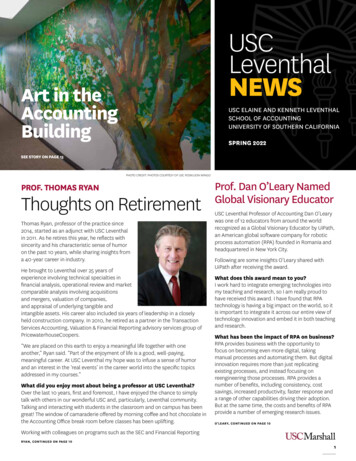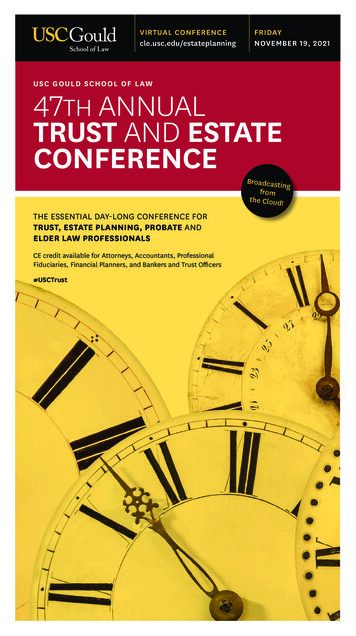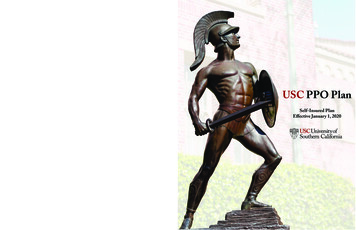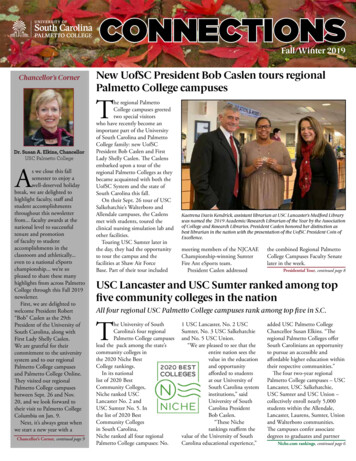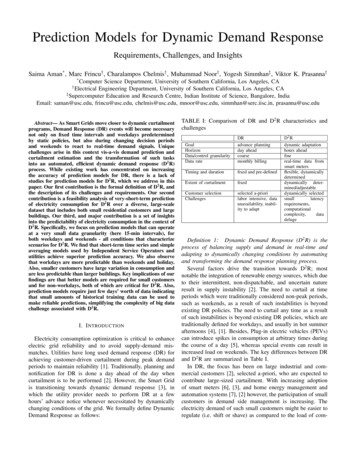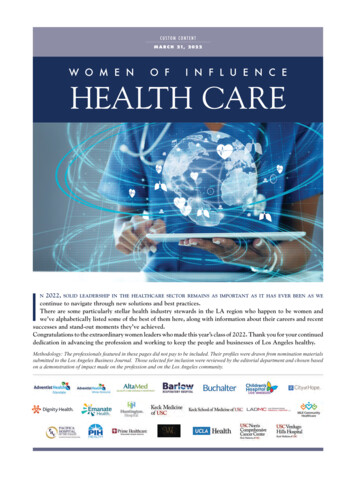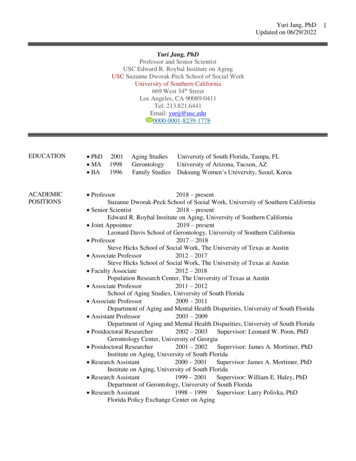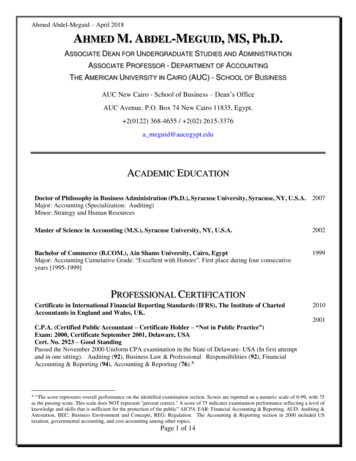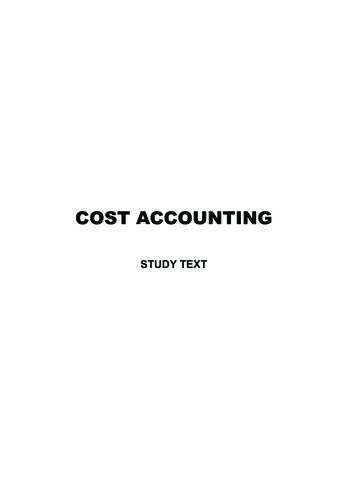
Transcription
USC Leventhal School of AccountingUSC Marshall School of BusinessACCOUNTING 470Advanced External Financial Reporting IssuesSyllabus – Fall 20214 units; 14120D; M & W: 10:00 am –11:50 am4 units; 14121D; M & W: 12:00 pm –1:50 pmProfessor:Office:Office Hours:Office Phone:E-Mail:Smrity RandhawaACC 234BM & W 9:10 am to 9:40 am & 2:15 pm to 3:45 pm; or by Appointment(213) 821-7840srandhaw@marshall.usc.eduCOURSE DESCRIPTIONDeveloping capabilities to identify, articulate, and resolve current external financial reporting challengesand issues, concentrating on operating, financing, and investing activities of business enterprises. Externalfinancial reporting refers to financial accounting information included within an organization’s externalfinancial reports such as SEC Form 10-K.LEARNING OBJECTIVESUpon successful completion of the course, students will be able to: Develop capabilities to identify and articulate current external financial reporting challenges andissues, concentrating on operating, financing, and investing activities of primarily businessenterprises, by solving problems and analyzing transactions. Be able to use accounting information, including the underlying professional standards required toprepare and report this information by using the FASB Codification (“ASC”) and otherauthoritative sources (SEC), to analyze, guide and support a position taken on complex accountingmatters. Analyze accounting information from the perspective of its various users (stakeholders) such asequity investors, creditors, company management and auditors, by preparing written and oralpresentations based on information presented in cases, SEC Filings, articles discussing emergingaccounting issues. Identify and describe differences between the various forms of business combinations by preparingbusiness combinations worksheets resulting in the preparation of consolidated financial statements. Recognize and explain differences between U.S. and International Financial Reporting Standards(IFRS) by using the FASB Codification, other U.S. authoritative sources to compare, identify andarticulate areas of convergence and disagreement with IFRS. Apply ethical principles and professional standards in analyzing situations and making informeddecisions.1
COURSE MATERIALS: Required Textbook: Intermediate Accounting 17th Edition, by Donald E. Kieso, Jerry J.Weydandt, and Terry D. Warfield; John Wiley & Sons, Inc.; 2019. ISBN: 978-1-119-50366-8 Required Textbook: Advanced Accounting 14th Edition, by Joe Ben Hoyle, Thomas Schaefer andTimothy Doupnik; McGraw Hill; 2020. ISBN: 978-1-260-24782-4 Accounting Standards Codification: You will need access to and develop competence with theFASB Accounting Standards Codification (“ASC”). The ASC represents the authoritativestandards that, in large measure, constitute Generally Accepted Accounting Principles (“GAAP”).See attachment at end of syllabus- “Using the American Accounting Association.” for logininstructions. Specific assignments related to the ASC are provided on the take-home quizzes.PREREQUISITE:Acct 370COREQUISITE:Acct 377COURSE NOTES:This course will consist of class discussions, homework, quizzes, in-class exercises, presentations, twomidterms, and a final examination. Students should attend class during the section for which they areofficially enrolled. Class slides and other class information will be posted on Blackboard.GRADING:AssignmentsThree ExamsMidterm 1Midterm 2Final ExamFinal Team ProjectProfessionalism, in-class exercise & class participationHomeworkGroup AssignmentsPoints10010010040202020400% of Grade25%25%25%10%5%5%5%100%Final grades represent how you perform in the class relative to other students. Your grade will not be basedon a mandated target, but on your performance. The average grade for this class is expected to averageabout 3.5. Three items are considered when assigning final grades:1. Your score for each of the items above weighted by the appropriate factor and summed.2. Your overall percentage score for the course.3. Your ranking among all students in the course(s) taught by your instructor during the currentsemester.The grade of “W” is allowed only if a student withdraws after the official add period and before the end ofthe drop period during the semester. The grade of incomplete (IN) can be assigned only if there is work not2
completed because of a documented illness or unforeseen emergency occurring after the drop period of thesemester that prevents the student from completing the semester. An “emergency” is defined as a seriousdocumented illness, or an unforeseen situation that is beyond the student’s control, that prevents a studentfrom completing the semester. Prior to the end of the drop period, the student still has the option ofdropping the class so incompletes will not be considered. Arrangements for completing an IN must beinitiated by the student and agreed to by the instructor prior to the final examination. All work required toreplace the IN with a final grade must be completed within one calendar year from the date the IN wasassigned. If the student does not complete the work within the year, the IN will automatically be convertedto a grade of F.CLASSROOM POLICIES - FALL 20211. Active class participation is important in achieving the learning objectives for this course. Unlessstudents provide an accommodation letter from USC OSAS or from Marshall detailing visa or travelrestrictions, attendance and active participation is expected in the classroom.2. Any student with such accommodations should submit their accommodation document to theirinstructor as soon as possible. Your instructor will then provide regular access to a recording of theclass and an opportunity to regularly make up missed in-class participation.3. Students who are experiencing illness should not attend class in person. Please inform the instructor inadvance of the class session to discuss what accommodations will be made to allow for the make-up ofmissed class work and missed in-class participation. Students will not be penalized for not attendingclass in person under these circumstances.General descriptions on the components of your grade (team case and team project assignments, etc.)are given below:Midterm ExamsThere will be two midterm examinations given during the semester. These midterms will start at thebeginning of class on the dates listed on the schedule. The midterms will emphasize material covered inlectures, homework assignments, and the text. The midterms may include multiple-choice questions, briefessay discussion questions, exercises and problems. In order to prepare for the midterm please make sureyou understand the assigned readings and the concepts discussed in class. There will be no make-upmidterms. If you have to miss a midterm for a valid reason, the score earned on the final examination willbe attributed to the missed examination. This policy is intended to accommodate sickness or otheremergencies.Final ExamThe final exam will include all material covered in the course subsequent to the second midtermexamination. It will be of similar nature to the midterm examinations. The date and time of the final examis listed below under “Course and Examination Schedule.”Final Team ProjectThe final project will require students to work in teams to integrate the material learned during the semesterin ACCT 470 to analyze an accounting issue. You will be graded on content (accuracy, completeness, etc.),writing style (grammar, consider your audience, etc.), professional appearance of your project, and theappropriate use of cited resources. More information about the final project will be discussed as the semesterprogresses. The due date for the written team assignment is Monday, November 29, 2021. Details on teammakeup and size will be given to you during the semester.3
Professionalism and Other Class ConductProfessionalism will be expected at all times. Because the university classroom is a place designed for thefree exchange of ideas, we must show respect for one another in all circumstances. We will show respectfor one another by exhibiting patience and courtesy in our exchanges. Appropriate language and restraintfrom verbal attacks upon those whose perspectives differ from your own is a minimum requirement.Courtesy and kindness are the norms for those who participate in my class.In-class ExercisesAt various points during the semester, unannounced exercises will be introduced to provide students withexamples of kind of material they should expect to see on exams. These exercises can be completed by adhoc groups, of five members or less, using any course materials present (i.e., open book/open notes).HomeworkIt is extremely important to complete the reading assignment and homework before class. HomeworkAssignments are required and due on Blackboard before class time. Homework assignments will be gradedfor effort not correctness. If you attempt each problem assigned, whether or not you get it right, you willreceive full credit. No make-ups or alternative assignments will be accepted but you will be allowed todrop three homework grades.Group AssignmentsThe group assignments will be posted on Blackboard and will comprise of exercises, brief essay discussionquestions and problems. Collaboration on these assignments is encouraged as it might enhance the learningprocess. There will be total of three group assignments during the semester and you will be allowed to dropone group assignments.TECHNOLOGY REQUIREMENTSWe are all living through unprecedented times and if needed, online lectures through Zoom will beprovided in Blackboard. Therefore, you must have access to the Internet to view/hear lectures. No specialsoftware is required.The lecture presentations, links to articles, assignments, quizzes, and rubrics are located on Blackboard. Toparticipate in learning activities and complete assignments, you will need: Access to a working computer that has a current operating system with updates installed, plusspeakers or headphones to hear lecture presentations; Reliable Internet access and a USC email account; A current Internet browser that is compatible with Blackboard (Google Chrome is therecommended browser for Blackboard); A working video camera with microphone for use on Zoom; Microsoft Word as your word processing program; and Reliable data storage for your work, such as a USB drive or Office365 OneDrive cloud storage.If your computer does not have Microsoft Word, Office 365 package is available to you free of charge andallows you to install Word, Excel, PowerPoint, Outlook, OneNote, Publisher, and Access on up to 5 PCs orMacs and Office apps on other mobile devices including tablets. Office 365 also includes unlimited cloudstorage on OneDrive. To download Office 365 log into your student (University) email through a webbrowser, choose Settings (top right corner), and select software. If you have further questions or need helpwith the software, please contact the USC ITS service portal.4
Some Netiquette Rules: Dress respectfully. Video conference business meetings are and will be the norm, so practice yourprofessional telepresence. Virtual background respectfully professional Display both your first and last name during video conferencing and synchronous class meetings. Respectfully minimize distractions with muting and video off when moving around Disagree respectfully Respectfully pay attention to classmates Re-Read, think, and edit your message before you click "Send/Submit/Post.". as a check, considerwhether you would be comfortable with your email or post or text being widely distributed on theInternet.Final Comments:This class has often been described by students as the toughest course they have taken during their time atUSC. The course material is dense and requires a lot of work but I have full confidence that every studentin my class is capable of learning and mastering the material. Just make sure you keep up with the readingand requisite practice. Instructional Assistants and I are here to help with your learning, make sure youattend our tutoring/office hours in case you are struggling with any material. Also, please feel free to emailme with any questions. I hope you find the course beneficial and enjoyable.5
Fall 2021 ACCT 470 Tentative Schedule of AssignmentsIA Intermediate Accounting 17th EditionAA Advanced Accounting 14th EditionClassNo.Date2 Aug 25ReadingsIA: Chapter 13 (pp. 13-1 to 13Introduction and Current Liabilities10)IA: Chapter 13 (pp. 13-10 to 13Current liabilities and Contingencies (Contd.) 25)3 Aug 30Long-term liabilities1 Aug 23TopicHW Problems (Due beforeclass)IA: BE13.11, BE13.12 andE13.11IA: Chapter 14 (pp. 14-1 to 1420)IA: BE14.2, BE14.5, BE14.6and BE14.9IA: Chapter 14 (pp. 14-26 to 1432)IA: BE14.13, E14.22 andE14.24 (a to c)4 Sep 1Sep 6Long-term liabilitiesLabor Day - No class5 Sep 8Stockholders' Equity (Group Assignment 1Available on Blackboard)IA: Chapter 15 (pp. 15-1 to 1-24)IA: BE15.2, BE15.4, BE15.8,BE15.13 and BE15.146 Sep 13Accounting for PensionsIA: Chapter 20 (pp. 20-1 to 2015)IA: BE20.2, BE20.3, BE20.5and BE20.67 Sep 158 Sep 209 Sep 22Accounting for Pensions (Group Assignment1 Due at 11:59 pm on Blackboard)Review DayExam 1IA: Chapter 20 (pp. 20-16 to 2032)IA: BE20.7, E20.2 and E20.5InvestmentsIA: Chapter 17 (pp. 17-1 to 1713)IA: BE17.1, BE17.2 andBE17.411 Sep 29InvestmentsIA: Chapter 17 (pp. 17-13 to 1725) AA: Chapter 1 (pp. 1 to 9)IA: BE17.5, BE17.6, BE17.7and BE17.812 Oct 4The Equity Method of Accounting forInvestmentsAA: Chapter 1 (pp. 9 to 22)AA: Problems 1-8, 1-12, 1-15and 1-2510 Sep 276
13 Oct 6Consolidation of Financial Information14 Oct 11Consolidations—Subsequent to the Date ofAcquisition (Group Assignment 2 Availableon Blackboard)AA: Chapter 2 (pp. 39 to 63)AA: Problems 2-6, 2-9, 2-11,2-19, 2-20 and 2-27(recommend use of Excel for2-27)AA: Chapter 3 (pp. 91 to 117)AA: Problems 3-10, 3-11, 312, 3-22 (recommend use ofExcel for 3-22)AA: Chapter 4 (pp. 157 to 184)AA: Problems 4-7, 4-8, 4-12and 4-30 (recommend useof Excel for 4-30)AA: Chapter 5 (pp. 213 to 233and pp. 236 to 239)AA: Problems 5-7, 5-8, 5-9,5-11 to 5-16.16 Oct 1817 Oct 2018 Oct 25Consolidated Financial Statements andOutside OwnershipConsolidated Financial Statements—IntraEntity Asset Transactions (GroupAssignment 2 Due at 11:59 pm onBlackboard)Review DayExam 219 Oct 27Foreign Currency Transactions and HedgingForeign Exchange RiskAA: Chapter 9 (pp. 409 to 436)AA: Problems 9-4, 9-5, 9-11,9-12 and 9-2620 Nov 1Foreign Currency Transactions and HedgingForeign Exchange RiskAA: Chapter 9 (pp. 436 to 442)AA: Problems 9-8 and 9-31.21 Nov 3Translation of Foreign Currency FinancialStatementsAA: Chapter 10 (pp. 479 to 504)AA: Problems 10-6, 10-7, 108, 10-9 and 10-24IA: Chapter 16 (pp. 16-1 to 1618)IA: BE16.1, BE16.2, BE16.4,BE16.6 and BE16.7IA: Chapter 16 (pp. 16-18 to 1630)IA: BE16.10, BE16.11,BE16.13 and BE16.15IA: Chapter 22 (pp. 22-1 to 2224)IA: BE22.1, BE22.5, BE22.6and E22.315 Oct 1322 Nov 823 Nov 10Dilutive securities and earnings per shareDilutive securities and earnings per share(Group Assignment 3 Available onBlackboard)24 Nov 15Accounting Changes and Error Analysis7
25 Nov 17Accounting for State and Local Governments(Group Assignment 3 Due at 11:59 pm onBlackboard)AA: Chapter 16 (pp. 739 to 761)26 Nov 22Nov 24Accounting and Reporting for Private Notfor-Profit EntitiesThanksgiving - No class27 Nov 2928 Dec 1Dec 10Dec 13AA: Chapter 18 (pp. 862 to 884)Team Presentation (Written reports due forall teams by 11:59 pm on Blackboard)Team PresentationFinal Exam for 12 pm section (11 am to 1pm)Final Exam for 10 am section (8 am to 10am)IA Intermediate Accounting 17th EditionAA Advanced Accounting 14th Edition8AA: Problems 16-1 to 16-9AA: Problems 18-5, 18-6 and18-39
GRADING AND ACADEMIC STANDARDSThe Leventhal School of Accounting adheres strictly to the grading standards of the University and theSchool of Business Administration. Additionally, the Leventhal School of Accounting has supplementedthose standards with certain others. For students' convenience, and to prevent misunderstanding, theseadditional standards are summarized below.GRADING STANDARDSThe following grades are used: A - excellent; B - good; C - fair; D - minimum passing; F - failure. Thegrade of F is awarded for failing work at the end of the semester. The assignment of minuses and pluseswhen earned is required.The grade of W (Withdraw) is assigned if the student officially withdraws after the third week but beforethe end of the twelfth week of the semester. No withdrawals will be permitted after the end of the twelfthweek except by student petition to the University's Committee on Academic Policies and Procedures.Students may elect to audit courses during the first three weeks of the semester. A course taken for audit(V) will be assessed at the current tuition rate. A course taken for audit (V) will not receive credit and willnot appear on the USC transcript or grade report. Under no circumstances will the University allow achange in the registration status of a course from letter grade or credit to audit (V) or vice versa after thethird week of a given semester.OTHER ACADEMIC STANDARDS1. The ability of students to write clearly and concisely is a necessary prerequisite to success inaccounting work. Accordingly, students will be required to demonstrate writing capability in allaccounting courses. This may be accomplished primarily through the inclusion of essay-type questionson course examinations.2. Academic Integrity: Ethics and values are very important in accounting, in the business world, and ineducation. We will consider ethical issues in accounting throughout this course. As an instructor, Iwill assume, barring evidence to the contrary, that you are an ethical student. To help you fulfill yourethical responsibilities as a student, the ethical standards for this course are listed below.Graded team assignments: All work is to be performed exclusively by the members of the team andall team members must contribute their fair share to each assignment. If outside research is performed,sources are to be cited and information discovered via outside research is to be clearly referenced assuch. The products of your research are not to be shared with any student who is not a member of theteam nor should you use the product of any prior students in the class.In-class examinations: All exams must be the exclusive work of the individual student. No studentmay share the exam contents with another student until exam grading has been fully completed.If you know that another student is violating these standards: Allowing another student to obtaincourse points by deceit contributes to a general lowering of the ethical standards of the University andcontributes to deception of potential employers and other academic institutions. Thus, you have anobligation to take some action when you know another student is violating the course's academicintegrity standards. This is a difficult personal trial to face, but it is an important part of your ethicalobligation as a student. If you know that another student is violating the standards, it is yourresponsibility to inform the student's instructor. See the latest edition of SCAMPUS for a discussion ofacademic integrity violations. In this course, academic integrity violations generally will be penalizedwith a grade of F for the course.9
ADDITIONAL INFORMATIONAdd/Drop ProcessMost Marshall classes are open enrollment (R-clearance) through the Add deadline. If there is an open seat,you can add the class using Web Registration. If the class is full, you will need to continue checking WebRegistration or the Schedule of Classes (classes.usc.edu) to see if a space becomes available. Students whodo not attend the first two class sessions (for classes that meet twice per week) or the first class meeting(for classes that meet once per week) may be dropped from the course. There are no formal wait lists forMarshall undergraduate courses, and professors cannot add students or increase the course capacity. If allsections of the course are full, you can add your name to an interest list by contacting the Office ofUndergraduate Advising & Student Affairs; if new seats or sections are added, students on the interest listwill be notified.Retention of Graded CourseworkFinal exams and all other graded work which affects the course grade will be retained for one year after theend of the course if the graded work has not been returned to the student. If I returned a graded paper toyou, it is your responsibility to file it.STATEMENT ON ACADEMIC CONDUCT AND SUPPORT SYSTEMSAcademic Conduct:Students are expected to make themselves aware of and abide by the University community’s standards ofbehavior as articulated in the Student Conduct Code. Plagiarism – presenting someone else’s ideas as yourown, either verbatim or recast in your own words – is a serious academic offense with serious consequences.Please familiarize yourself with the discussion of plagiarism in SCampus in Part B, Section 11, “BehaviorViolating University Standards” policy.usc.edu/scampus-part-b. Other forms of academic dishonesty areequally unacceptable. See additional information in SCampus and university policies on scientificmisconduct at t Systems:Counseling and Mental Health - (213) 740-9355 – 24/7 on callstudenthealth.usc.edu/counselingFree and confidential mental health treatment for students, including short-term psychotherapy, groupcounseling, stress fitness workshops, and crisis intervention.National Suicide Prevention Lifeline - 1 (800) 273-8255 – 24/7 on callsuicidepreventionlifeline.orgFree and confidential emotional support to people in suicidal crisis or emotional distress 24 hours aday, 7 days a week.Relationship and Sexual Violence Prevention and Services (RSVP) - (213) 740-9355(WELL), press“0” after hours – 24/7 on callstudenthealth.usc.edu/sexual-assaultFree and confidential therapy services, workshops, and training for situations related to gender-basedharm.10
Office of Equity and Diversity (OED)- (213) 740-5086 Title IX – (213) 821-8298equity.usc.edu, titleix.usc.eduInformation about how to get help or help someone affected by harassment or discrimination, rights ofprotected classes, reporting options, and additional resources for students, faculty, staff, visitors, andapplicants. The university prohibits discrimination or harassment based on the following protectedcharacteristics: race, color, national origin, ancestry, religion, sex, gender, gender identity, genderexpression, sexual orientation, age, physical disability, medical condition, mental disability, maritalstatus, pregnancy, veteran status, genetic information, and any other characteristic which may bespecified in applicable laws and governmental regulations. The university also prohibits sexual assault,non-consensual sexual contact, sexual misconduct, intimate partner violence, stalking, maliciousdissuasion, retaliation, and violation of interim measures.Reporting Incidents of Bias or Harassment - (213) 740-5086 or (213) 821-8298usc-advocate.symplicity.com/care reportAvenue to report incidents of bias, hate crimes, and microaggressions to the Office of Equity andDiversity Title IX for appropriate investigation, supportive measures, and response.Office of Student Accessibility Services - (213) 740-0776https://osas.usc.edu. SASfrntd@usc.eduSupport and accommodations for students with disabilities. Services include assistance in providingreaders/notetakers/interpreters, special accommodations for test taking needs, assistance witharchitectural barriers, assistive technology, and support for individual needs.USC Support and Advocacy - (213) 821-4710uscsa.usc.eduAssists students and families in resolving complex personal, financial, and academic issues adverselyaffecting their success as a student.Diversity at USC - (213) 740-2101diversity.usc.eduInformation on events, programs and training, the Provost’s Diversity and Inclusion Council, DiversityLiaisons for each academic school, chronology, participation, and various resources for students.USC Emergency - UPC: (213) 740-4321, HSC: (323) 442-1000 – 24/7 on calldps.usc.edu, emergency.usc.eduEmergency assistance and avenue to report a crime. Latest updates regarding safety, including ways inwhich instruction will be continued if an officially declared emergency makes travel to campusinfeasible.USC Department of Public Safety - UPC: (213) 740-6000, HSC: (323) 442-120 – 24/7 on calldps.usc.eduNon-emergency assistance or information.11
LSOA Learning ObjectivesProgram LearningObjective1. Technical Knowledge2. Research, Analysis andCritical Thinking3. Ethical Decision Making4. Communication5. Leadership,Collaboration andProfessionalism6. TechnologyLevel ofCoverageDescriptionStudents will demonstrate technical proficiency in theaccounting discipline, including the use of technicalaccounting knowledge to help solve problems and makedecisions.Students will demonstrate the ability to critically analyze,synthesize, and evaluate information for decision making inthe local, regional and global business environment.Students will demonstrate an understanding of ethics,ethical behavior and ethical decision-making.Students will demonstrate the ability to communicate ideasboth orally and in writing in a clear, organized andpersuasive manner.Students will demonstrate leadership skills and the abilityto work cooperatively and productively to accomplishestablished goals.Students will demonstrate an understanding of technologyissues and utilize relevant technology tools and applicationsto gather and evaluate information, analyze and solveproblems, work interactively with other people, anddevelop and present ght
USC Leventhal School of AccountingImportant DatesFall 2021First Day of ClassMonday, August 23Labor Day HolidayMonday, September 6USC Virtual Career FairSeptember 22-23, 10 am - 3 pmMeet the Firms (Virtual)Friday, September 24, 11 am - 2 pmLast Class Meeting for Regular (060) and 442 sessionsFriday, December 3Study DaysSaturday- Tuesday, December 4-7Final Exams for Regular (060) and 442 sessionsWednesday, December 8-Wednesday,December 15Regular Session Dates (Session 060), August 23 - December 3First Day of ClassesLast Day to Add or Drop w/out a “W”Last Day to Change from P/NP to Letter GradeLast Day to Drop with a "W"Monday, August 23Friday, September 10Friday, October 8Friday, November 1213
USC Leventhal School of Accounting USC Marshall School of Business ACCOUNTING 470 Advanced External Financial Reporting Issues Syllabus - Fall 2021 4 units; 14120D; M & W: 10:00 am -11:50 am 4 units; 14121D; M & W: 12:00 pm -1:50 pm Professor: Smrity Randhawa Office: ACC 234B .

